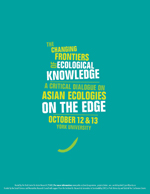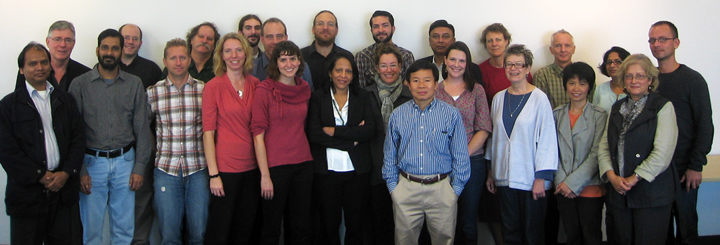The Ecologies on the Edge research programme brought together scholars from the social and natural sciences, including sociology, anthropology, ecology, law, geography and political science to investigate key processes affecting vulnerable ecologies in Asia, Africa, Latin America and the Arctic. It built on several interdisciplinary research clusters at York University. It was a joint initiative of the the York Centre for Asian Research (YCAR) and the Institute for Research and Innovation in Sustainability (IRIS).
The research team submitted a SSHRC-MCRI letter of intent in January 2009 and was successful in obtaining an MCRI development grant later that year. A workshop was held at York University in July 2009 and included scholars from across Canada. In 2011, research team was awarded funding from the Social Sciences and Humanities Research Council of Canada for “Changing Frontiers of Ecological Knowledges: A Critical Dialogue of Asian Ecologies on the Edge,” an Asia-focused workshop.

Changing Frontiers of Ecological Knowledges: A Critical Dialogue of Asian Ecologies on the Edge
In 2011, Peter Vandergeest (Geography) and Shubhra Gururani (Anthropology) organized an Asia-focused workshop co-hosted by YCAR and IRIS. The workshop explored changing practices and discourses of environmental knowledges and governance, both locally and globally. Asia is a significant site for these ecological and social transformations, a place where we can understand changing forms of ecological knowledge and environmental management in diverse, globally important, and fragile ecologies.
The two-day day interdisciplinary event was held on 12–13 October 2011 and included scholars and industry experts from Asia, Europe and North America with expertise in social and ecological change in the mountains, coastal zones, grasslands and forests of Asia.
Their papers addressed how new strategies of documenting, monitoring and evaluating environmental change have led to a proliferation of ecological knowledge in Asia. Key questions for the workshop include: 1) who has access to diverse kinds of ecological knowledge; 2) how this knowledge reshapes how communities who live in fragile ecologies participate in decision-making about these ecologies and; 3) how new forms of ecological knowledge shape environmental management.
The workshop took stock of current research on the production, circulation and use of ecological knowledge, with particular attention to how access to this knowledge is organized and how it is used in decision-making; assessed how new information technologies are re-organizing community access to resources and decision-making; identified ways of moving environmental management toward practices that are more democratic and inclusive of local populations; and defined potential new areas of collaborative research that will form the basis of future research proposals.
The workshop was supported by the Social Sciences and Humanities Research Council of Canada (SSHRC).
A special issue of Conservation and Society on Ecological Knowledge in Asia focused on research presented at the workshop is a key project output.

